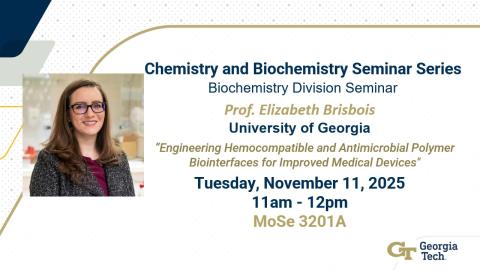event
Biochemistry Division Seminar - Prof. Elizabeth Brisbois (UGA)
Primary tabs
Title: Engineering Hemocompatible and Antimicrobial Polymer Biointerfaces for Improved Medical Devices
Abstract: Interactions at material–tissue interfaces play a pivotal role in the performance of biomedical devices, from small-scale applications such as insulin cannulas and catheters to complex extracorporeal artificial organs used daily in thousands of patients. Blood-contacting devices face two critical clinical challenges: (1) platelet activation leading to thrombosis, and (2) infection. Hospital-acquired infections—exacerbated by the growing prevalence of antibiotic-resistant bacterial strains—remain a serious concern, affecting millions of patients each year in the United States alone. These infections lead to biofilm formation, which is notoriously difficult to eradicate due to high resistance to conventional antibiotics. A promising strategy to address these challenges is the development of therapeutic biomaterials that release bioactive molecules, such as nitric oxide (NO), thereby mimicking the body’s natural mechanisms to inhibit clot formation and combat microbial pathogens. This presentation will highlight Dr. Brisbois’ work on engineering NO-releasing polymeric biomaterials by incorporating NO donor chemistries, followed by their characterization and optimization in vitro. These materials are subsequently used to fabricate prototype devices (e.g., catheters, extracorporeal life-support systems) and are evaluated in clinically relevant animal models for their ability to prevent both thrombosis and infection. Advancing such biointerfaces represents a critical step toward enhancing medical device biocompatibility and overcoming translational challenges in clinical applications.
Bio: Dr. Brisbois is currently an Associate Professor and Distinguished Faculty Fellow in the School of Chemical, Materials, & Biomedical Engineering at the University of Georgia. She completed a National Institutes of Health (NIH) Postdoctoral Fellowship at the University of Michigan Medical School in the Department of Surgery, where she worked in the Extracorporeal Life Support (ECLS) laboratory under the direction of Dr. Robert H. Bartlett (Emeritus Surgeon and “Father of ECMO”). She earned her Ph.D. in Chemistry at the University of Michigan in 2014 under the supervision of Dr. Mark E. Meyerhoff. She obtained a B.S. degree in Chemistry and a B.S.Ed. in Secondary Education at Concordia University Nebraska in 2008. Currently, Dr. Brisbois’ research focus is in the field of polymeric biomaterials and the development of therapeutic biomolecules aimed at addressing challenges related to medical devices, diseases, and patient care. Her translational research aims to design novel multifunctional polymers and small molecule therapeutics, characterize for their properties in vitro, and evaluate their potential biomedical applications in clinically relevant animal models. Her research has been supported through competitive grants from the National Institutes of Health (NIH R01s), Juvenile Diabetes Research Foundation (JDRF), Center for Disease Control (CDC), Department of Defense (DoD), and the Georgia Clinical & Translational Science Alliance (GA CTSA). Her work has been well-received by peer-reviewed journals, resulting in > 75 publications and > 20 patents and patent disclosures. Throughout her academic career, she has been awarded several honors, including most recently: elected Senior Member of the National Academy of Inventors, UGA Creative Research Medal, UGA Team Impact Award, UGA College of Engineering Excellence in Research Award, American Chemical Society WCC Rising Star Award, National Academy of Engineers – Frontiers of Engineering, American Chemical Society Young Investigator Award (PMSE division), the Society for Biomaterials SC&M SIG Young Investigator Award.
Status
- Workflow status: Published
- Created by: mcurtis41
- Created: 11/04/2025
- Modified By: mcurtis41
- Modified: 11/04/2025
Categories
Keywords
User Data
Target Audience

